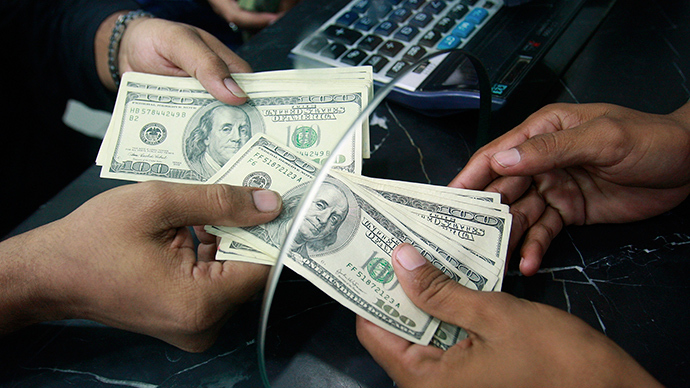Tennessee to vote on banning income tax in perpetuity

On Election Day, Tennesseans will vote on whether or not to amend the state constitution to permanently ban income and payroll taxes in the Volunteer State. But even if the resolution fails, it is unlikely the legislature will institute new taxes.
Republican state Sen. Brian Kelsey sponsored the resolution putting the amendment on the ballot and heads the 'Yes on 3' committee urging its ratification. He said not having an income tax makes Tennessee "more fiscally responsible" and that permanently banning one would appeal to businesses, according to the Associated Press.
"Not having an income tax has already brought jobs to Tennessee, and permanently banning an income tax will bring even more jobs to the state," Kelsey said.
Vote "Yes On 3 = Income Tax Free"- @BrianKelsey@TNGOP@HamCoTNpic.twitter.com/c6E2Pl2kBO
— Bo Watson (@SenBoWatson) October 13, 2014
Currently Tennessee has the so-called “Hall tax,” which is a six percent tax on interest and dividends, but doesn't tax income. “The state constitution gives the government the right to tax property as well as income from stocks and bonds, but it does not mention personal income,” the Motley Fool noted. “Every so often lawmakers try to institute an income tax, as the constitution does not specifically bar this.”
There is also a seven percent sales tax. In 2011, the average per-capita state and local tax paid was the second-lowest in the US at $2,777, according to the Tax Foundation.
Until 1999, it was widely thought that the state constitution already banned an income tax, Ben Cunningham, spokesman for Tennessee Tax Revolt, a Tea Party-allied group pushing the amendment, told the Washington Examiner. But that year, the state attorney general issued an opinion saying that because the state taxed dividend and interest income, it could also adopt a regular income tax.
In 2001, then-Gov. Don Sundquist, a Republican, moved to adopt an income tax, saying the state needed additional revenue to balance the budget. His plan proposed a four percent income tax with a $7,000-per-person exemption and was coupled with a reduced sales tax rate and abolishing the sales tax on food. That attempt failed in 2002 after protests outside the statehouse in Nashville, which included a brick being thrown through the window of the governor's office and demonstrators banging on the doors of the Senate chamber while lawmakers attempted to go about their business inside.
Republican state Sen. Rusty Crowe told the Johnson City Press that the amendment is directly related to Sundquist’s attempts to impose an income tax.
“Some of us that read the Tennessee Constitution know that we tax privileges, not rights,” Crowe said. “From time to time in our state’s history, a general income tax has been proposed and challenged in the Tennessee Supreme Court. Each time it was ruled unconstitutional. I think Sundquist felt he could get enough votes from the bench to change that.”
Kelsey’s proposed constitutional amendment reads:
Shall Article II, Section 28 of the Constitution of Tennessee be amended by adding the following sentence at the end of the final substantive paragraph within the section: Notwithstanding the authority to tax privileges or any other authority set forth in this Constitution, the Legislature shall not levy, authorize or otherwise permit any state or local tax upon payroll or earned personal income or any state or local tax measured by payroll or earned personal income; however, nothing contained herein shall be construed as prohibiting any tax in effect on January 1, 2011, or adjustment of the rate of such tax.
That provision would allow the continuation of the state's Hall tax.
Opponents of Amendment 3 believe that a personal income tax would limit the options of future generations and could help reduce taxes overall.
“This is not a referendum on whether or not to have an income tax or a payroll tax but it is a question on whether we should enshrine in the constitution a limitation on future decisions that voters may feel the need to decide. It may be an emergency or something,” Dick Williams of Citizens for Fiscal Sanity, a group opposing Amendment 3, told the Memphis Commercial Appeal.
“We believe that passing this amendment will inevitably lead to either higher sales taxes or higher businesses taxes, and on the local level, higher property taxes,” he continued. “If things got serious and this amendment got enshrined, possibly a statewide property tax could be considered. We think it’s clear that like everything else, governmental costs will rise and they won’t be offset by economic growth alone.”
@knoxnews takes editorial position Against Amendment 3! The No on 3 fight gains steam! http://t.co/Ga6ro8rqRz#TN#Tennessee
— Vote No on 3 (@VoteNo3TN) October 9, 2014
However, research by Travis Brown and Dr. Art Laffer, co-authors of Wealth of States, shows that states without personal income taxes have outperformed those that do.
“States without personal income tax over the past 50 years have grown faster in population and grown their economy more relative to states with them,” Brown told the Nashville Business Journal. “Not having a personal income tax puts [Tennessee] at a distinctive advantage.”
Brown believes that passing the amendment will “greatly help the path of prosperity the state has seen over the past few decades,” which would be “an important long-run signal.”
Amendment 3, to keep TN income tax free, was featured today on "America's Forum" http://t.co/iTFOi1G8rq
— Brian Kelsey (@BrianKelsey) September 25, 2014
There are seven states with no income tax: Alaska, Florida, Nevada, South Dakota, Texas, Washington and Wyoming. New Hampshire joins Tennessee as the states that have no income tax, but levy charges on interest and dividends. Even if the proposed constitutional amendment fails, Tennesseans will likely not face any new taxes on their income. Republicans have a super-majority in both houses of the Volunteer State’s legislature, as well as a Republican governor (who told the Commercial Appeal he plans to vote for the amendment), so the likelihood any such measure would be introduced in the Nashville is slim-to-none.














